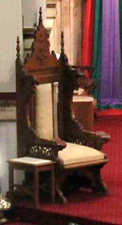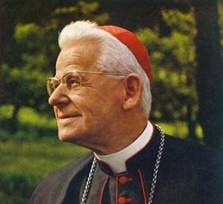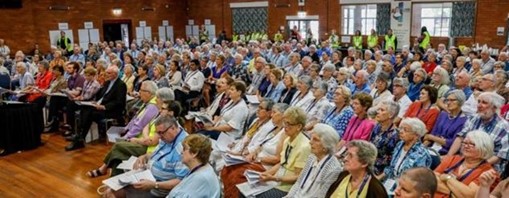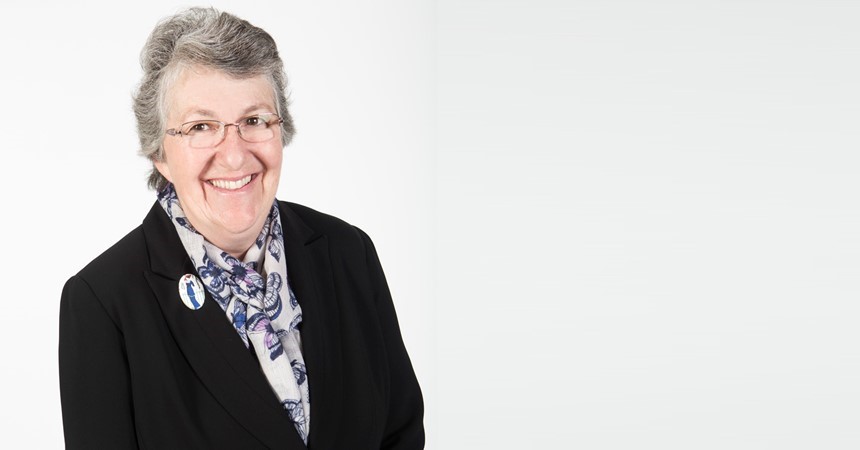 I was thinking of him on Saturday as I attended The Cardijn Lecture, hosted by the Australian Cardijn Institute on The Emergence of Synodality: The Latin American Experience, presented by Professor Rafael Luciani, a Venezuelan lay theologian.
I was thinking of him on Saturday as I attended The Cardijn Lecture, hosted by the Australian Cardijn Institute on The Emergence of Synodality: The Latin American Experience, presented by Professor Rafael Luciani, a Venezuelan lay theologian.
You may wonder why Bishop Bill was particularly on my mind. Both Bishop Bill and I, along with other people from across Australia, were part of the Young Christian Students Movement (YCS) of the 1960’s and 1970’s. This is a student run movement which uses the Joseph Cardijn method of “SEE, JUDGE, ACT” which enables students to SEE what is happening in the world around us and analyse facts, to then JUDGE this in light of our beliefs and the Gospel, and to take ACTION to transform not only the world around us but ourselves. YCS still exists and forms part of our diocesan outreach to young people.
I was thinking of Bishop Bill and me, and how the YCS was so critical to our formation as Christian leaders, not only then but now and in all of the intervening years. I recall leading small groups in which we would reflect on Gospel passages and then the following week do what was called, the Review of Life. At quite a young age we learnt how to read the scriptures in light of the world around us and to then take action. It challenged us to look beyond ourselves in the light of the teachings of Jesus. Not only would we meet each week at school or in the parish, but we would have holiday YCS camps, where we would gather with young people from across a number of schools. I recall attending a couple of camps at Morpeth before I moved to Sydney. Like Bishop Bill, these experiences were life-changing for me and many others, who continue to lead our church from a ‘synodal’ position. We learnt the method of journeying with each other, of deep listening, of reflecting on encounters in the light of faith and of responding.
You may be interested to know that Bishop Bill died on the birthday of Joseph Cardijn, (13 November 1882 – 24 July 1967). Joseph Cardijn was a Belgian priest who devoted his life to bringing Christianity to the working class and advocating for an end to the dehumanising influences that were enforced onto them. He began the Young Christian Worker Movement (YCW) from which the YCS has its origins. I wonder if this is what led Bishop Bill to explore some of his priestly ministry in places like Moree and Mt Druitt. Like Joseph Cardijn, Bishop Bill saw the priesthood of the ordained as a means of bringing positive change and hope to those he encountered.
The Movement plays a role in seeing the world as it should be, and not as it is. I hope in this phrase you can hear echoes of synodality. Rafael Luciani spoke about synodality and the continual work of renewal and reform that is required in our church. Like the YCS, synodality is a movement of formation and change in which we respectfully journey with each other, from both grassroots and hierarchical organisations.
During the webinar, on Saturday afternoon, I remembered the change management project introduced by Bishop Bill in 2017, which we call, Many parts, One body, One mission. The thinking behind these core changes sought by Bishop Bill was around having overt structures of participation across our diocese in aiding the curia to serve the diocese better and to work better together. He identified four core areas for change:
- Instituting a ‘Council for Mission’ for the whole diocese, which will review our overall direction as Church, establish priorities for the development of our ministries, agencies and services and foster collaborative initiatives between agencies. The Council will meet regularly throughout the year and establish this as a priority.
- The Diocesan Executive will be expanded to include Directors of agencies to enhance information sharing and opportunities for joint planning and projects across the curia.
- Existing agency Boards and Councils will be charged primarily with exercising governance of the agency directly, through each Director, and providing periodic reports to the Diocesan Executive.
- Within the curia, bringing together resources and services that all areas of the curia may benefit from, and which do not need to exist as separate units in each agency. This will enable agency leadership to focus on core business, reduce confusion across agencies and diminish duplication of staff and resources. This will also enable staff in these areas to have opportunities for broader experience.
While a lot of what Bishop Bill imagined has been accomplished, there is still work that needs to be done in achieving his vision for a more collaborative synodal diocese focused on God’s mission in our diocese. He would become very frustrated if the talk was only about structures and not about our core business of being the Good News of God’s love for all of humanity.
The following words come from a document which is ‘under construction’ as part of the work of one of the Synod Working Party’s Focus Group on Governance Principles and Documentation:
By virtue of their baptism, all the faithful enjoy true equality in dignity and action. Hence, all are called to co-operate, according to their particular circumstances and responsibilities, in building up the Body of Christ and in fulfilling the mission that God gave the Church to accomplish in the world. The organic nature of ecclesial communion and the spirituality of communion require the Bishop to evaluate the structures of participation envisaged by canon law. These structures guarantee a dimension of communion in the pastoral governance of the Bishop, insofar as they generate a kind of reciprocal interplay between what a Bishop is called to contribute to the good of the diocese through exercising his personal responsibility, and the contribution made through the collaboration of all the faithful. The Bishop should keep clearly in mind that these structures of participation do not take their inspiration from criteria of parliamentary democracy, because they are consultative rather than deliberative. Fruitful dialogue between a Pastor and his faithful will unite them “a priori in all that is essential, and… [lead] them to pondered agreement in matters open to discussion”. In promoting the participation of the faithful in the life of the Church, the Bishop will recall the rights and duties of governance to which he is personally bound. These include not only witnessing, nurturing and caring for the faith, but also cherishing, defending and proposing it rightly.
The co-ordination and marshalling of all diocesan resources requires opportunities to gather for joint reflection. The Bishop needs to make sure that these encounters are well prepared and not unduly long, that they have clear objectives and achieve tangible results. In this way, with a genuine Christian spirit, the participants establish a good mutual rapport and sincerely seek to collaborate. (N.165 Congregation for Bishops, Directory for The Pastoral Ministry of Bishops, Apostolorum Successores, 2004)

I believe this forms the legacy for our own diocesan synodal journey during Bishop Bill’s time as Bishop of the Diocese of Maitland-Newcastle. We have been striving to create structures with a focus on both our need for spiritual and structural conversion so that God’s mission can be accomplished in this time and place. Pope Francis refers to this as our search for a new institutional model of Church for the third millennium.
Bishop Bill’s last words to me in a text on Friday afternoon were, Fiat voluntas tua (Thy will be done) from one of his favourite prayers. I will finish with his other favourite prayer, the prayer of St Ignatius of Loyola, which both of us know from our years in YCS:
Lord Jesus, teach me to be generous, to serve you as you deserve to be served, to give without counting the cost, to fight without counting the wounds, to work without seeking rest, then to spend my life without expecting any other in return, then the knowledge that I do your holy will, Amen.
Eternal rest, grant unto him O Lord, and let perpetual light shine upon him. May he rest in peace, may he rest in peace. Amen.
Teresa Brierley
Director Pastoral Ministries
16 November 2021

